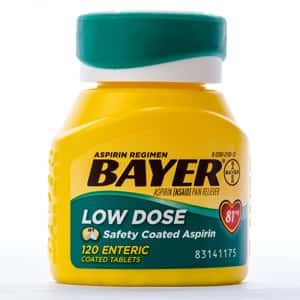
A major controversy in medicine has to do with the value of aspirin. This inexpensive drug has been available for more than 100 years. It remains a gold-standard pain reliever and fever reducer. No other over-the-counter drug has been proven superior. But questions remain about its potential other benefits. Will aspirin help reduce the risk of a heart attack or stroke? What about its potential anti-cancer activity? Many readers have been confused by recent research reporting questionable benefits. They wonder if they should stop aspirin suddenly.
The Latest Aspirin Research Creates Confusion:
Q. There was an article in my newspaper about some new research on older people in good health showing that taking low dosages of aspirin does not lower their risk of cardiovascular disease, dementia or disability. The aspirin increased the risk of significant bleeding in the digestive tract and brain.
My wife and I have been taking aspirin for years, hoping and believing we were doing good. To date, neither one of us has had any heart issues. Our question is should we continue taking the low dosage or stop immediately?
A. The new research published in The New England Journal of Medicine (Sept. 16, 2018) found that aspirin did not prevent heart attacks in healthy people over 70 years old. You are right that volunteers taking aspirin were more likely to experience bleeding problems.
Your question seems simple, but the answer is not. You should not discontinue aspirin suddenly without checking with your doctors. Last year, Swedish investigators reported a higher rate of heart attacks and strokes in people who suddenly stopped taking low-dose aspirin (Circulation, Sep. 26, 2017).
When People Stop Aspirin Suddenly:
The Swedish study involved over 600,000 users of low-dose aspirin (75-160 mg). These people were followed for a median of three years.
The authors note:
“In this large nationwide patient cohort, discontinuation of long-term low-dose aspirin was associated with a >30% higher risk of cardiovascular events, corresponding to an additional cardiovascular event observed per year in 1 of every 74 patients who discontinue aspirin. The risk appeared to increase as soon as the patients discontinued aspirin, with no safe interval.”
Something that many physicians have not considered when encouraging patients to stop aspirin suddenly is a potential rebound effect. The Swedish researchers point out that sudden aspirin withdrawal might lead to a risk of blood clots. The increased risk of cardiovascular complications occurred “shortly after discontinuation” of aspirin.
A review of the Swedish study and other aspirin research in the Journal of Thoracic Disease (January, 2018) concluded:
“Discontinuing long-term aspirin outside the setting of major surgery or bleeding appears unsafe, and efforts should be made to improve adherence.”
Another Alarming Swedish Study:
Other Swedish researchers studied the consequences of suddenly stopping aspirin after the discovery of a bleeding ulcer. This can be a life-threatening situation and it is not surprising that doctors would want to stop aspirin suddenly in such patients.
In this small study at Karolinska University Hospital in Stockholm, 40% of the patients were told to immediately discontinue their low-dose aspirin (Clinical Gastroenterology and Hepatology, Jan. 2013).
What happened over the following two years was startling:
“In patients with cardiovascular disease, discontinuation of low-dose aspirin therapy after peptic ulcer bleeding increases risk of death and acute cardiovascular events almost 7-fold.”
The People’s Pharmacy Perspective:
Obviously the results of this study put physicians and patients in a double bind. People taking aspirin who develop a bleeding ulcer are in imminent danger. It is an emergency situation. Virtually all gastroenterologists in the U.S. would immediately demand that aspirin be stopped. But if people have heart disease and stop aspirin suddenly, they may dramatically increase their risk for a heart attack. What a dilemma!
Aspirin is a double-edged sword. It has benefits but it can also cause ulcers and serious bleeding episodes. For people who are over 70 and healthy, aspirin may represent more of a risk than a benefit. For people who are middle-aged with heart disease, aspirin may represent a net benefit.
People should not stop aspirin suddenly unless a health professional has advised them about the best way to do so. People who are about to undergo major surgery should always get clear instructions about how to phase off aspirin.
As far as we can tell, there have been no studies to determine the best way to taper off aspirin. This is a discussion best had with the prescribing physician. Make sure the physician is aware of the Swedish research! People with heart disease may need to remain on aspirin indefinitely unless told precisely how to discontinue the drug.

